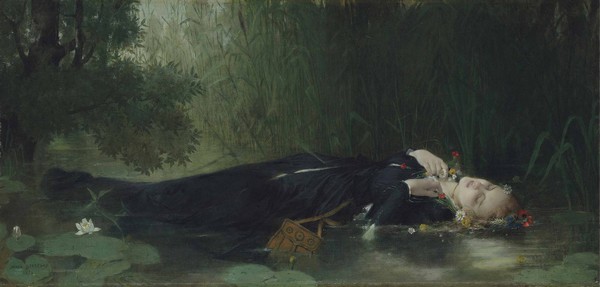
The 2019 marks 150 years since the death of Hector Berlioz, he's one of the composers we celebrate this year. Let us face facts: songs are not the best known of Berlioz's work; The most performed are those included in Les nuits d'étè, and I thought that this cycle would be often programmed during this season, but I was wrong. In any case, we are interested in Berlioz's songs, and I suggest that we listen to a really beautiful one, which gives us the opportunity to meet Ophelia again.
Berlioz composed La mort d'Ophélie in 1842, after having composed the previous year Les nuits d'étè (the version for voice and piano). In those years, the romance began to revive as a reaction to the introduction of the Lied in Paris; The art and the prestige of Berlioz and other composers were at the service of a musical form that languished. The text of La mort d'Ophélie, which Berlioz called a ballad, was written by his friend and patron Ernest Legouvé, who some years before had provided economic aid so as he could finish his opera Benvenuto Cellini. Legouvé half translates, half adapts Gertrude's description of Ofelia's death at the end of Act IV of Hamlet; Therefore, this time we won't hear Ophelia's voice, as we hear it in Brahms, Strauss or Moniuszko's songs. Or maybe we will...
Does the queen sincerely regret Ophelia's fate? According to Berlioz's melancholic song, she does. Legouvé's poem has four stanzas, and the composer writes a varied strophic song. He keeps the vocal line quite similar in all the stanzas, while he modifies the accompaniment depending on what Gertrudis tells us. Thus, at the first stanza we hear what seems the chearful watercourse of the brook; the second one begins with melancholic triplets and turns anxious when the queen explains how Ophelia fell into the brook. Between the first and second stanza we listen to an interlude, a vocalise on the interjection "Ah!"; After the third and fourth stanzas we hear it again, shorter and played only by the piano, and the song ends with the vocalise. In the third stanza, Gertrudis tells us that Ophelia was singing while she was swept downstream by the current, so we can imagine that this interlude is the song that the girl sings; In some way, we also hear her voice in this song.
Berlioz composed La mort d'Ophélie for voice and piano; Six years later he made a version for female choir and orchestra; no wonder that he came back to this gorgeous song! These two versions are listed in their catalogue as H. 92A and H. 92B, respectively. Shortly after he joined a version for choir and piano with another earlier piece, Méditation religieuse, in a work called Tristia, H. 119A; These two works, but in the version for choir and orchestra, along with a third one, Marche funèbre for the last scene of Hamlet, formed the second version of Tristia, H. 119B, published in 1851. In 1863, Berlioz published again La mort d'Ophélie in the Collection de 32 mélodies, H. 139; pay attention to this mess if you need the reference.
If you just want to hear the ballad, make yourself comfortable and get ready to enjoy eight or nine wonderful minutes. It's no easy to choose a recording of La mort d'Ophélie; Berlioz specified in the score that the song was for soprano or tenor, but curiously enough, there aren't male recordings while there are many mezzo soprano recordings. Le'ts listen to one of them, Susan Graham, accompanied by Malcolm Martineau. I hope you like their version as much as I do.
Auprès d’un torrent Ophélie
Cueillait, tout en suivant le bord,
Dans sa douce et tendre folie,
Des pervenches, des boutons d’or,
Des iris aux couleurs d’opale,
Et de ces fleurs d’un rose pâle
Qu’on appelle des doigts de mort.
Ah!
Les riants trésors du matin,
Elle les suspendait aux branches,
Aux branches d’un saule voisin.
Mais trop faible le rameau plie,
Se brise, et la pauvre Ophélie
Tombe, sa guirlande à la main.
Quelques instants sa robe enflée
La tint encor sur le courant
Et, comme une voile gonflée,
Elle flottait toujours chantant,
Chantant quelque vieille ballade,
Chantant ainsi qu’une naïade
Née au milieu de ce torrent.
Mais cette étrange mélodie
Passa, rapide comme un son.
Par les flots la robe alourdie
Bientôt dans l’abîme profond
Entraîna la pauvre insensée,
Laissant à peine commencée
Sa mélodieuse chanson.
Ah!
That shows his hoar leaves in the glassy stream.
There with fantastic garlands did she come
Of crowflowers, nettles, daisies, and long purples,
That liberal shepherds give a grosser name,
But our cold maids do dead men's fingers call them.
There on the pendant boughs her coronet weeds
Clamb'ring to hang, an envious sliver broke,
When down her weedy trophies and herself
Fell in the weeping brook. Her clothes spread wide
And, mermaid-like, awhile they bore her up;
Which time she chaunted snatches of old tunes,
As one incapable of her own distress,
Or like a creature native and indued
Unto that element; but long it could not be
Till that her garments, heavy with their drink, 3330
Pull'd the poor wretch from her melodious lay
To muddy death.














Comments powered by CComment